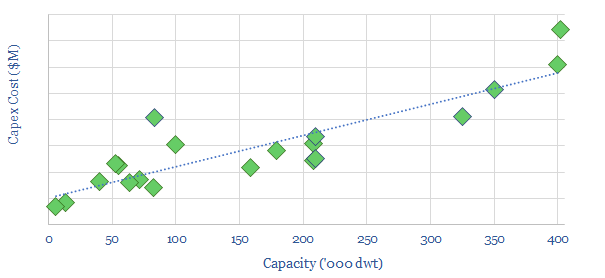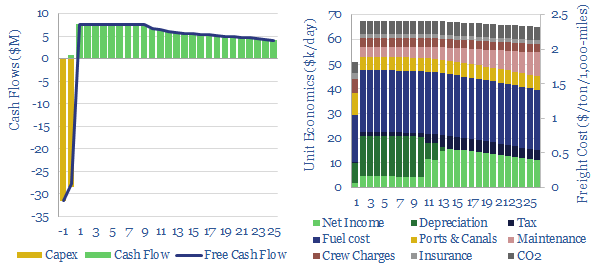Bulk carriers move 5GTpa of commodities around the world, explaining half of all seaborne global trade. This model is a bulk shipping cost breakdown. We estimate a cost of $2.5 per ton per 1,000-miles, and a CO2 intensity of 5kg per ton per 1,000-miles. Marine scrubbers increasingly earn their keep and uplift IRRs from 10% to 12% via fuel savings.
Bulk carriers and global trade. 13,000 bulk carriers, with 100MT of carrying capacity, transport over 5GTpa of bulk commodities ever year, in vessels with deadweight tonnage (dwt) of 4,000 – 400,000 tons. This is c50% of all global trade by mass. Of this dry bulk, c25% is iron ore, 20-25% is coal, c10% is grain, while the remaining 40-45% spans other metals and materials.
Economic modelling. This data-file models the economics of bulk carriers, including a breakdown of bulk shipping cost, across capex, opex costs, fuel, crew charges, port charges, maintenance, and insurance.
In our base case a large Capesize (or Newcastlemax) bulk tanker, with 200,000 dwt of capacity, must charge a total day rate of $67,000 per day to earn a 10% IRR (chart above) off of $60M pa capex costs (chart below).

Bulk shipping cost per ton? Costs per ton are estimated at $2.5 per ton per 1,000 miles, while CO2 intensity is estimated at 5kg per ton per 1,000 miles, as a large bulk carrier will consume 300-500bpd of oil products. Inputs and outputs can be flexed in the model.
Which oil products as used by bulk tankers? Oil products will comprise 30-50% of total shipping costs for a bulk carrier, depending on whether the vessel is consuming marine gasoil (0.1% sulphur, EU/North American limits), low sulfur fuel oil (0.5%, IMO limit) or heavier fuel oil (3.5% sulphur, but this requires a scrubber to be IMO-compliant).
Marine scrubbers are increasingly being installed. They might cost $2-6M (depending on the ship size), but pay for themselves in subsequent fuel savings. Numbers can be stress-tested in the model, but we estimate that a vessel with a scrubber will either earn 35% higher cash margins, 2% higher IRRs overall, or achieve 7% lower total shipping costs. Our flue gas desulfurization (scrubber) model is linked here.
Costs can also be compared to our models of container shipping, LNG shipping, and CO2 shipping.
Leading companies in bulk shipping? Some of the largest bulk shipping fleets are associated with global mining companies, such as Vale, which operates the largest vessels in the world, above 400,000 tons, ferrying iron ore from Brazil to China. Leading pure-plays include Golden Ocean (listed, US/Norway), Oldendorff (private, HQ’ed in Germany) and Star Bulk (listed, HQ’ed in Greece).
